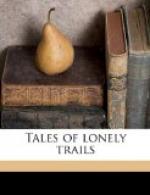Dragging my bags I hurried toward the fire. Nielsen was building a barricade of rocks to block the flying sparks. Suddenly I espied Romer. He sat on a log close to the blaze. His position struck me as singular, so I dropped my burdens and went to him. He had on a heavy coat over sweater and under coat, which made him resemble a little old man. His sombrero was slouched down sidewise, his gloved hands were folded across his knees, his body sagged a little to one side, his head drooped. He was asleep. I got around so I could see his face in the firelight. Pale, weary, a little sad, very youthful and yet determined! A bloody bruise showed over his temple. He had said he would ride all the way to Mormon Lake and he had done it. Never, never will that picture fade from my memory! Dear, brave, wild, little lad! He had made for me a magnificent success of this fruitless hunting trip. I hoped and prayed then that when he grew to man’s estate, and faced the long rides down the hard roads of life, he would meet them and achieve them as he had the weary thirty-five Arizona miles from Long Valley to Mormon Lake.
[Illustration: Skunk, A frequent and rather dangerous visitor in camp]
[Illustration: On the rim]
[Illustration: Where elk, deer, and turkey drink]
Mutton tasted good that night around our camp-fire; and Romer ate a generous portion. A ranger from the station near there visited us, and two young ranchers, who told us that the influenza epidemic was waning. This was news to be thankful for. Moreover, I hired the two ranchers to hurry us by auto to Flagstaff on the morrow. So right there at Mormon Lake ended our privations.
Under one of the huge pines I scraped up a pile of needles, made Romer’s bed in it, heated a blanket and wrapped him in it. Almost he was asleep when he said: “Some ride, Dad—Good-night.”
Later, beside him, I lay awake a while, watching the sparks fly, and the shadows flit, feeling the cold wind on my face, listening to the crackle of the fire and the roar of the gale.
IV
Eventually R.C. and Romer and I arrived in Los Angeles to find all well with our people, which fact was indeed something to rejoice over. Hardly had this 1918 trip ended before I began to plan for that of 1919. But I did not realize how much in earnest I was until I received word that both Lee Doyle in Flagstaff and Nielsen in San Pedro were very ill with influenza. Lee all but died, and Nielsen, afterward, told me he would rather die than have the “flu” again. To my great relief, however, they recovered.
From that time then it pleased me to begin to plan for my 1919 hunting trip. I can never do anything reasonably. I always overdo everything. But what happiness I derive from anticipation! When I am not working I live in dreams, partly of the past, but mostly of the future. A man should live only in the present.




